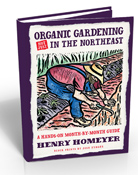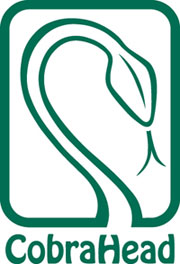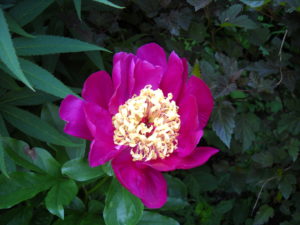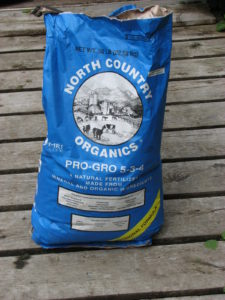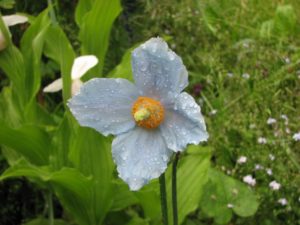Why Grow Flowers Organically? (And How to Improve Your Soil)
When I mentioned to an acquaintance that I not only grow my vegetables with organic methods, but my flowers, too, he looked at me funny and asked, “Why? Are you going to eat your peonies?” No, I don’t eat my peonies, but I do believe they are healthier and produce better than they would be if I used chemical fertilizers and pesticides.
Mother Nature has been growing green plants for 100 million years or more, and never once has she needed a 50 pound bag of 10-10-10, a bottle of herbicide to spray on weeds or a bag of insecticide. Chemical companies have been promoting their products for 100 years or more, and some chemicals can increase flower size or help to quickly improve bad soils. But they come with liabilities, too.
Chemicals added to your lawn or garden may inhibit the growth and viability of beneficial microorganisms. Most chemical fertilizers are composed of salts of nitrogen, phosphorus and potassium. Salts dry out living tissue and can easily kill microorganisms. Too much fertilizer can dry out and kill root hairs of your precious plants, too.
Plants thrive in soils that are biologically active: soils that are full of beneficial fungi, bacteria, protozoa. I read once that a teaspoon of healthy soil can contain 5 billion bacteria, 20 million filamentous fungi and a million protozoa. Those improve soil tilth and fertility.
Some gardeners tend to think of fungi and bacteria as bad: they think of fungi as the mildews and molds that disfigure garden phlox or leaves on lilac bushes. But in the soil there are many more good bacteria and fungi than bad ones.
Chemical fertilizer have just three useful elements, nitrogen, phosphorous and potassium. The rest is just filler. Organic bagged fertilizers are made from things like ground oyster shells and peanut hulls, dried seaweed and perhaps dried blood. So organic fertilizers have a wide range of useful minerals used by plants. Let’s look at what some of those ingredients do.
Nitrogen, the first number on a bag, is the key additive in fertilizers, as it promotes green growth. Unfortunately, chemical fertilizers often have so much soluble nitrogen that it can push plants to grow too fast. Think gawky teenage boy who grows 6 inches in one summer. Plants that grow too fast are often weak and susceptible to insects and diseases. It has been proven that too much nitrogen actually attracts insects to plants.
Organic fertilizers have a mix of soluble fertilizer and time-release fertilizer. In Pro-Gro, the fertilizer I use most often, about 75% of the nitrogen is released over time, and is made most available in warmer weather when plants are most active. That’s good. A chemical fertilizer can largely wash away in a week of rain.
Phosphorus, the middle number on a bag of fertilizer, is good for promoting growth of roots, fruits and flowers. It is commonly available as phosphate, and can pollute streams and rivers, causing algal bloom in lakes. Rock phosphate is a very slow-releasing form that is commonly used in organic fertilizers. Rock phosphate is slowly broken down by acids produced by fungi that coat roots of plants.
Potassium, the third number on the bag, helps plants to produce thick cell walls and protect them against dehydration and very cold temperatures. It is also involved in carbohydrate metabolism and cell division.
In a bag of organic fertilizer are many other ingredients including calcium, magnesium and sulfur. These are called secondary macronutrients because they are not needed in the quantities of the three listed above.
Calcium is involved in pH regulation of the soil (limestone contains calcium and is commonly used to increase the pH), and in cell metabolism and building proteins. Magnesium of part of the chlorophyll molecule involved in photosynthesis. Sulfur is necessary for making proteins and fats. It is what gives onions their bite.
What else is in an organic fertilizer? Iron, chlorine, manganese, zinc, copper, boron, molybdenum and nickel. These are called micronutrients as they are used in very small quantities, but each is important to plants. They are not included in a chemical fertilizer.
Compost, which is made from once living beings or stuff produced by them– whether manure or leaves, for example – contains the minerals cited above. It also improves soil structure and a soil’s ability to hold moisture and drain well. Adding compost is key to getting great soil. You can buy it by the truckload, or by the bag. Compost sold in bags should smell like good earth. It if smells like fresh manure or sulfur, you don’t want it.
It’s too early for soil improvement, but spring will be along soon. Don’t do much until the soil dries out. My garden does well each year and I am rarely troubled by insect pests. I believe that the moderate growth promoted by compost and organic fertilizer is a key reason for my “good luck” in the garden.
Read Henry’s blog posts at https://dailyuv.com/

